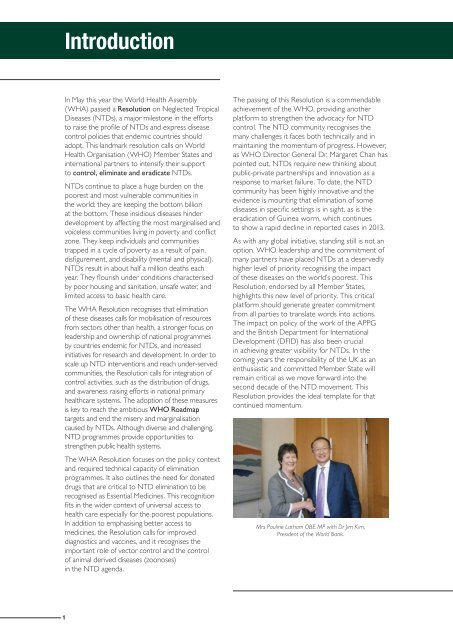1jeGTyf
1jeGTyf
1jeGTyf
Create successful ePaper yourself
Turn your PDF publications into a flip-book with our unique Google optimized e-Paper software.
Introduction<br />
In May this year the World Health Assembly<br />
(WHA) passed a Resolution on Neglected Tropical<br />
Diseases (NTDs), a major milestone in the efforts<br />
to raise the profile of NTDs and express disease<br />
control policies that endemic countries should<br />
adopt. This landmark resolution calls on World<br />
Health Organisation (WHO) Member States and<br />
international partners to intensify their support<br />
to control, eliminate and eradicate NTDs.<br />
NTDs continue to place a huge burden on the<br />
poorest and most vulnerable communities in<br />
the world: they are keeping the bottom billion<br />
at the bottom. These insidious diseases hinder<br />
development by affecting the most marginalised and<br />
voiceless communities living in poverty and conflict<br />
zone. They keep individuals and communities<br />
trapped in a cycle of poverty as a result of pain,<br />
disfigurement, and disability (mental and physical).<br />
NTDs result in about half a million deaths each<br />
year. They flourish under conditions characterised<br />
by poor housing and sanitation, unsafe water, and<br />
limited access to basic health care.<br />
The WHA Resolution recognises that elimination<br />
of these diseases calls for mobilisation of resources<br />
from sectors other than health, a stronger focus on<br />
leadership and ownership of national programmes<br />
by countries endemic for NTDs, and increased<br />
initiatives for research and development. In order to<br />
scale up NTD interventions and reach under-served<br />
communities, the Resolution calls for integration of<br />
control activities, such as the distribution of drugs,<br />
and awareness raising efforts in national primary<br />
healthcare systems. The adoption of these measures<br />
is key to reach the ambitious WHO Roadmap<br />
targets and end the misery and marginalisation<br />
caused by NTDs. Although diverse and challenging,<br />
NTD programmes provide opportunities to<br />
strengthen public health systems.<br />
The WHA Resolution focuses on the policy context<br />
and required technical capacity of elimination<br />
programmes. It also outlines the need for donated<br />
drugs that are critical to NTD elimination to be<br />
recognised as Essential Medicines. This recognition<br />
fits in the wider context of universal access to<br />
health care especially for the poorest populations.<br />
In addition to emphasising better access to<br />
medicines, the Resolution calls for improved<br />
diagnostics and vaccines, and it recognises the<br />
important role of vector control and the control<br />
of animal derived diseases (zoonoses)<br />
in the NTD agenda.<br />
The passing of this Resolution is a commendable<br />
achievement of the WHO, providing another<br />
platform to strengthen the advocacy for NTD<br />
control. The NTD community recognises the<br />
many challenges it faces both technically and in<br />
maintaining the momentum of progress. However,<br />
as WHO Director General Dr. Margaret Chan has<br />
pointed out, NTDs require new thinking about<br />
public-private partnerships and innovation as a<br />
response to market failure. To date, the NTD<br />
community has been highly innovative and the<br />
evidence is mounting that elimination of some<br />
diseases in specific settings is in sight, as is the<br />
eradication of Guinea worm, which continues<br />
to show a rapid decline in reported cases in 2013.<br />
As with any global initiative, standing still is not an<br />
option. WHO leadership and the commitment of<br />
many partners have placed NTDs at a deservedly<br />
higher level of priority recognising the impact<br />
of these diseases on the world’s poorest. This<br />
Resolution, endorsed by all Member States,<br />
highlights this new level of priority. This critical<br />
platform should generate greater commitment<br />
from all parties to translate words into actions.<br />
The impact on policy of the work of the APPG<br />
and the British Department for International<br />
Development (DFID) has also been crucial<br />
in achieving greater visibility for NTDs. In the<br />
coming years the responsibility of the UK as an<br />
enthusiastic and committed Member State will<br />
remain critical as we move forward into the<br />
second decade of the NTD movement. This<br />
Resolution provides the ideal template for that<br />
continued momentum.<br />
Mrs Pauline Latham OBE MP with Dr Jim Kim,<br />
President of the World Bank.<br />
1


